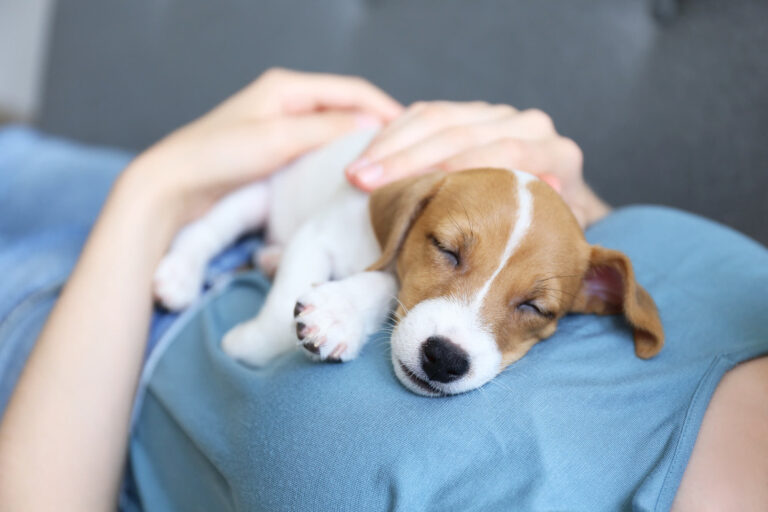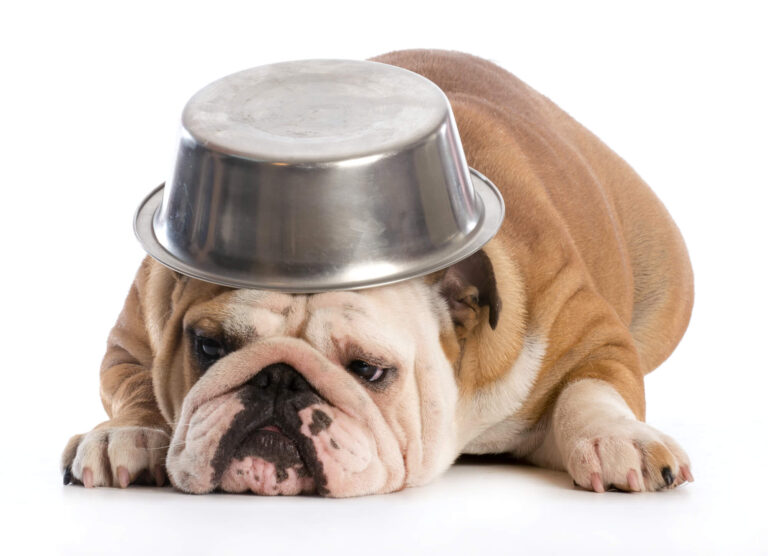Why Are Chihuahuas So Mean and Aggressive? [Explained]
When most people think of a Chihuahua, the image of a yappy little ankle biter comes to mind.
There’s no denying that Chihuahuas can be feisty dogs with big personalities. While this may be true for some Chihuahuas, not all Chihuahuas are mean and aggressive.
Marco grew up with several Chihuahuas as family dogs, so he always thought of them as sweet and loving dogs.
But, as a kid, Michelle was terrorized by a Chihuahua that was kept in the neighbor’s garage with the door always open enough so that he could come and go whenever he liked.
This dog would frequently chase Michelle when she went outside and eventually bit her one day.
After that incident, she condemned Chihuahuas as unruly and unadoptable dogs.
That is until the day we decided to adopt a dog.
When we went to the shelter, we fell in love with the sweetest, cutest Chihuahua and rescued him.
We’ve learned not all Chihuahuas are mean or vicious – it depends a lot on their training and background.
When walking our Chihuahua, Leo, we commonly hear comments like “what a ferocious dog” and “easy, killer” which has led us to believe that there are still a lot of misconceptions about this breed.
So, why are Chihuahuas so mean and aggressive? Why do they have such a bad reputation?
In this blog post, we will explore all the reasons why Chihuahuas tend to act this way and what you can do to reduce aggression and improve the reputation of Chihuahuas.

Why are Chihuahuas So Mean?
There’s a widespread stereotype that all Chihuahuas are mean and violent.
Meanwhile, our Chihuahua Leo is a kind, shy dog who loves cuddling.
Those who act mean usually behave this way because of one (or a combination) of reasons.
Chihuahuas are perceived as mean because as the smallest dog breed living in a world of much bigger dogs and people, they tend to put up a front.
From their perspective, a person would look more like a giant and a dog might resemble a bear!
This can make them feel threatened, insecure, and scared, which can result in acting “mean” or “feisty” when they are just trying to defend and assert themselves.
In a big world full of unfamiliar sights and alarming sounds it’s not surprising that Chihuahuas are usually quick to bark and bite.
Old age can make some Chihuahuas grumpy too as they can no longer see or hear as well as they used to.
However, Chihuahuas who have been properly trained can be some of the most affectionate, loyal, and smart dogs.
They would just love to follow you around all day and nap between your legs.
Why Are Chihuahuas So Aggressive?
Chihuahuas are so aggressive mainly due to a lack of proper training and socialization mixed with past traumas.
Genetics, health conditions, and fear can also be factors in why a Chihuahua might be aggressive.
Chihuahuas are very territorial and protective of their people and property, which can lead to aggression if they feel threatened. They can be aggressive toward people, other animals, or even their owner(s).
Having their space invaded or being taunted can also trigger a Chihuahua’s aggression. Growling and snapping are a dog’s way of saying “back off!”
Also, people tend to ignore the warning signs small dogs give since they believe a small dog can’t hurt them, but this leads to the dog intensifying and escalating their aggression.
Let’s take a closer look at each of these reasons why Chihuahuas are so mean and aggressive.

17 Reasons Why Chihuahuas Are So Mean and Aggressive
1. Lack of Proper Training
A big reason why Chihuahuas are so mean is due to a lack of training.
One of the most common misconceptions about Chihuahuas is that they don’t need much training and that they can’t hurt anybody because they’re so small.
However, this couldn’t be further from the truth and it can lead to a number of behavioral problems, including aggression.
Even though Chihuahuas are tiny dogs that can fit into handbags, they still need training just as much as big dogs. They need to learn basic obedience commands and work on any reactivity issues.
We need to treat Chihuahuas the same as we’d treat a big dog. We can’t just pick them up and manipulate them to get them to do what we want and then expect them to be well-behaved in public. They need structure and training just like any other dog.
2. Lack of Proper Socialization
Another reason why some Chihuahuas are mean and aggressive is because they didn’t get proper socialization when they were a puppy between 7 to 16 weeks.
Socialization is important for all puppies, but it’s especially important for Chihuahuas. This is because they are small dogs that can be easily intimidated by other animals and people.
Without proper socialization, Chihuahuas can turn into fearful, reactive dogs. This fear can lead to aggression, anxiety, and nervousness.
It’s important to socialize puppies early on and expose them to different types of people and animals.
Some good ways to socialize your Chihuahua include:
- puppy classes
- having doggy playdates
- going to the park
- going on pack walks
- having friends and family over
- visit pet stores
- visit pet-friendly stores like Home Depot
If your Chihuahua is aggressive or reactive, then it’s best to avoid dog parks because they could get into a situation where they bite another dog.

3. Past Trauma
Why are some Chihuahuas so mean? Well, it could be because they’ve been through traumatic experiences in the past, such as being abandoned, a natural disaster, or the death of their owner which can cause PTSD.
If a Chihuahua was abused or neglected, it can also cause them to become aggressive as an adult. They may be afraid of people and lash out when they feel threatened.
If your Chi is aggressive, they could have a history of trauma, so it’s important to be patient and understanding. They may need extra time and patience to warm up to you.
It’s also critical to consult with a professional trainer or behaviorist to help you work with your Chihuahua.
4. Genetics
If you’re thinking, why is my Chihuahua so mean? The answer could be because he was poorly bred. If one or both of a Chihuahua’s parents were aggressive, chances are the offspring will be too.
That’s why it’s important to do your research before you purchase or adopt a Chihuahua. If you’re getting a Chihuahua from a breeder, make sure to ask about the parents’ temperaments.
Adopting an adult dog from a shelter is also a great option. This way, you’ll know their temperament already.
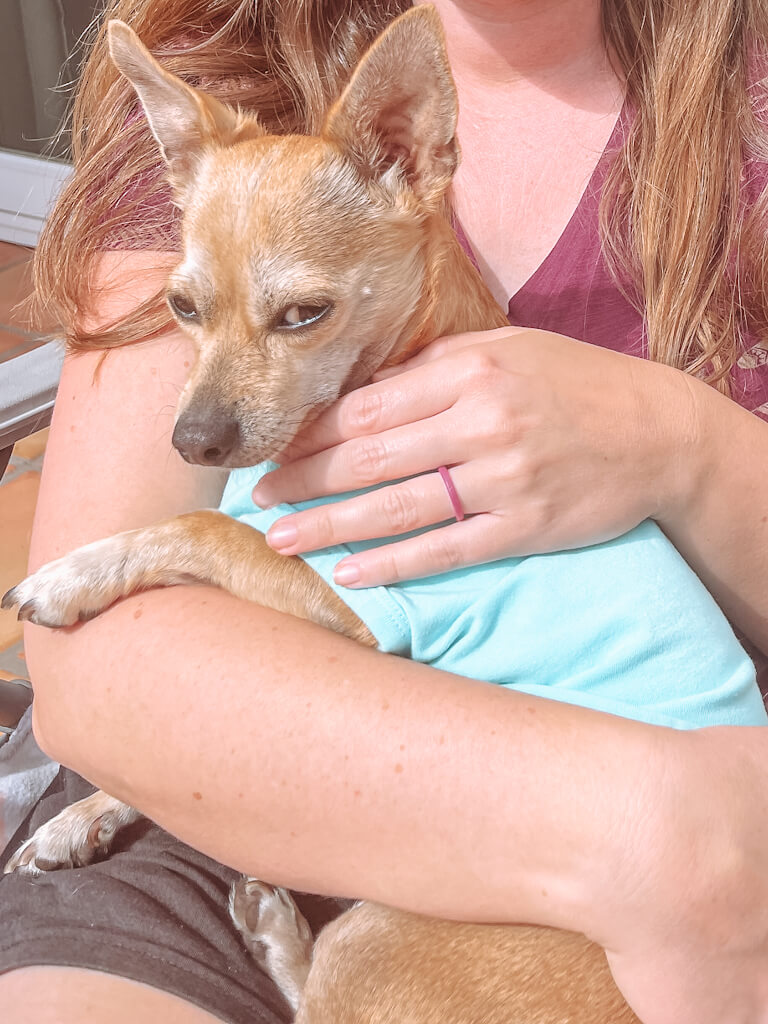
5. Fear
Many Chihuahuas are afraid of things that are much bigger than them, such as big dogs and strangers.
Some other common fears in Chihuahuas can include loud noises, the weather, kids, brooms, flies, and vet visits.
Some Chihuahuas are nervous and skittish while others turn to aggression to try to protect themselves, especially when cornered. This is called the fight or flight response.
It’s important to socialize Chihuahuas early on so they can learn to trust people and not be so afraid.
If you have a Chihuahua that’s fearful or aggressive, consult with a professional trainer or behaviorist. They can help you work on desensitization and counterconditioning exercises to help your Chihuahua feel more comfortable.
6. Territorial and Protective
Chihuahuas are known to guard their space and their people. They can become aggressive and angry if they feel like their territory or owner is being threatened. Chihuahuas feel the need to defend their space from intruders, whether it’s another animal or a person.
This can manifest as growling and barking excessively when the doorbell rings, if they sense an animal outside, or if guests come over.
Another example is with mother dogs who are very protective over their puppies. They can become aggressive and hostile if they feel like their puppies are being threatened or if you get to close.
If you know your Chihuahua is very territorial, it’s best not to bother them when they’re in their space. For example, if they’re in their crate or bed, don’t invade their space.
7. Health Condition
Sometimes, mean and aggressive behavior in Chihuahuas can be caused by a health condition.
If your Chihuahua is acting out of character, it’s important to take them to the vet to rule out any possible medical causes like an injured limb or dental issues.
Chihuahuas are prone to breaking their fragile bones, having teeth problems, and tracheal collapse. All of these health issues can cause pain and make your Chihuahua act aggressively.
When your Chihuahua is in pain or doesn’t feel well, they may start acting differently. Some Chihuahuas cry, some excessively lick their injury, some sleep more, and some show aggression.
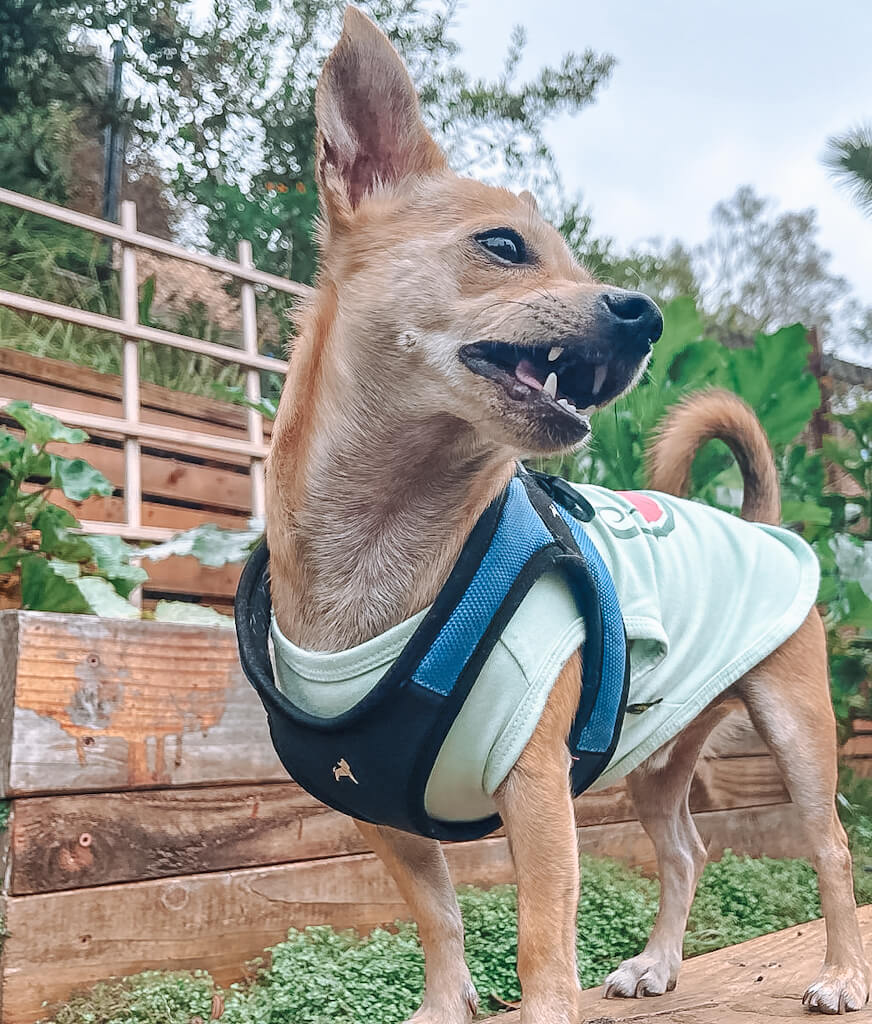
8. Old Age
Why are Chihuahuas so mean when they get older? As Chihuahuas get older, they may start to experience some cognitive decline. This can lead to a condition called Canine Cognitive Dysfunction Syndrome (CDS).
CDS is similar to Alzheimer’s disease in humans. It can cause changes in your Chihuahua’s sleep patterns, increased anxiety, and aggression.
If you think your Chihuahua may be suffering from CDS, it’s important to take them to the vet.
Dogs can get irritable and cranky as they get older. As your Chihuahua ages, it’s important to be patient and understanding. They may need more time to warm up to people and may not be as tolerant of other animals.
9. A New Pet is Introduced
If you already have a Chihuahua and you introduce a new dog to the family, it can be stressful for both animals. Your Chihuahua may become jealous and start acting out.
If your Chihuahua is older and you get a new puppy, your Chihuahua may not want to be around that crazy puppy energy and may become aggressive.
It’s important to introduce new pets slowly and carefully for short periods of time. Baby gates and crates will help keep them separated so they can still have their own space.
10. A Family Change
If there’s a big change in your family, such as a move, the birth of a baby, or a death in the family, it can be stressful for your Chihuahua. They may become anxious or depressed, which can lead to aggression.
If your Chihuahua is going through a tough time, it’s important to be understanding and patient. They may need more attention and reassurance during this time. Provide a safe space for them with their favorite toys and bed.
11. Small Dog Syndrome
Most Chihuahuas develop what’s called “Small Dog Syndrome.”
This means they exhibit behaviors like barking excessively, pulling at the leash, being overly territorial, nipping, biting, and growling at other people or animals.
Why do Chihuahuas get so angry and aggressive around big dogs? This is because Chihuahuas know they can’t take on a dog that size, but they feel the need to protect their territory and defend themselves because they are small and vulnerable.
Most signs of Small Dog Syndrome are labeled as “cute” or laughed off because “that’s just how Chihuahuas are.” But it’s actually a serious behavior problem that can be dangerous for both your Chihuahua and other people.
Typically, little dogs have their subtle warning signs ignored, so they feel the need to escalate quickly. That is why Chihuahuas seem so aggressive.
If a Pitbull had a bone and growled at you when you approached, you would most likely leave him alone and maybe be afraid. A Pitbull’s bite could do some serious damage.
But put a tiny Chihuahua in that same scenario and some will think it’s funny and keep approaching, not respecting the Chihuahua’s personal space.
This lack of respect is why many Chihuahuas become more aggressive because people think it’s okay to keep bothering them and picking them up.

12. Resource Guarding
Some Chihuahuas guard their food, toys, or other objects. They may growl, snap, or bite if someone tries to take it away from them.
Resource guarding is a natural behavior for dogs. But if it’s not managed properly, it can lead to serious aggression problems.
13. Frustration
Frustration when on a leash, also known as leash reactivity, is a common behavior problem in dogs. They may bark, lunge, growl, or snap at people or other animals when they’re walking on a leash.
This usually happens because they’re frustrated or excited and want to get to the person or animal but can’t. This is seen as aggression but it can also be a sign of fear or anxiety.
14. Taunting
Some people think it’s funny to tease or taunt a Chihuahua. They may make loud noises, try to put their hand in their dog’s food bowl, or wave their hand around near their dog’s face.
This can be very stressful for your Chihuahua and can lead to aggression. It’s important to never tease or taunt your Chihuahua, or any dog for that matter.
15. Redirected Aggression
Redirected aggression happens when a dog is agitated or excited but can’t get to the person or animal they’re trying to reach. So they take their frustration out on the nearest person or animal, even if it’s their owner.
This can happen when your Chihuahua is trying to get to another dog but is being held back on a leash. Or if they see another dog through a window or fence and can’t get to them.
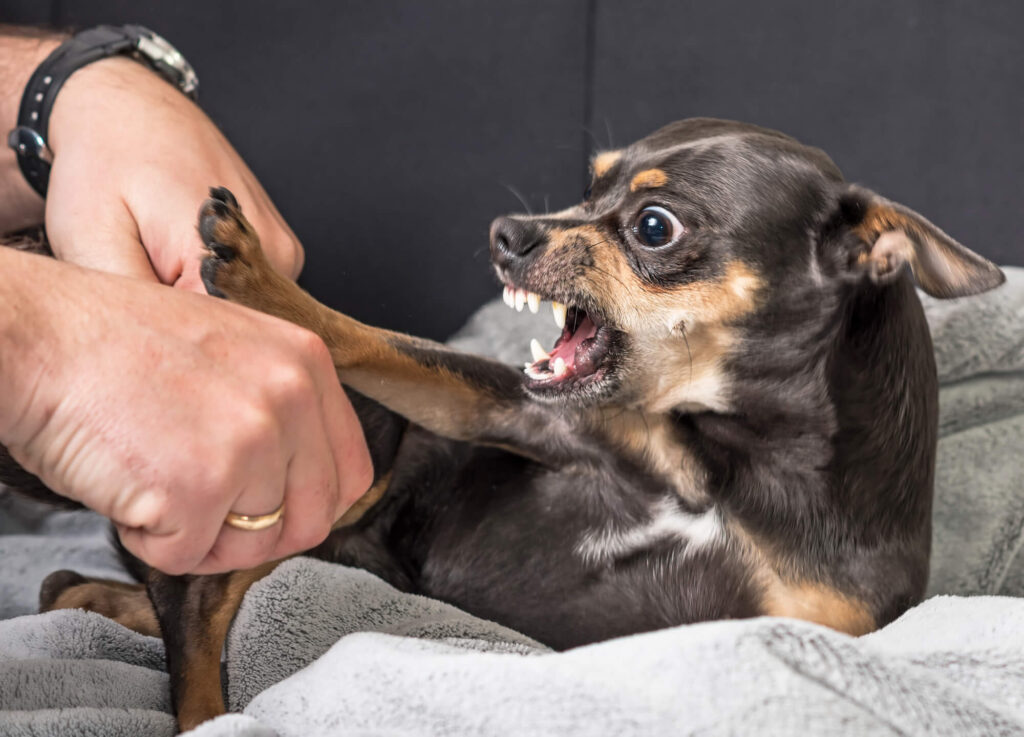
16. Lack of Love and Attention
Why are Chihuahuas so angry? A Chihuahua that doesn’t get enough love, attention, and exercise can become angry and frustrated. This can lead to all sorts of behavior problems, including aggression.
Chihuahuas are social creatures and need to be around people to be happy. If you’re not home often or you don’t spend much time with your Chihuahua, they may start to act out.
That’s why it’s so important to give your Chihuahua the love and attention they need. Take them for walks, play with them, and cuddle with them every day. Chihuahuas should not just be kept outside where they will be prone to developing behavior problems such as barking a lot.

17. Inter-Dog Aggression
Why are Chihuahus so aggressive toward other dogs? It could be due to inter-dog aggression.
Inter-dog aggression is when a dog displays aggressive behavior with other dogs, whether they are part of the same household or not. It generally happens more with dogs of the same gender.
There are several reasons why a dog may be inter-dog aggressive. It could be due to a lack of socialization or because they were abused or neglected in the past. It could also be a sign of fear or territorial behavior.
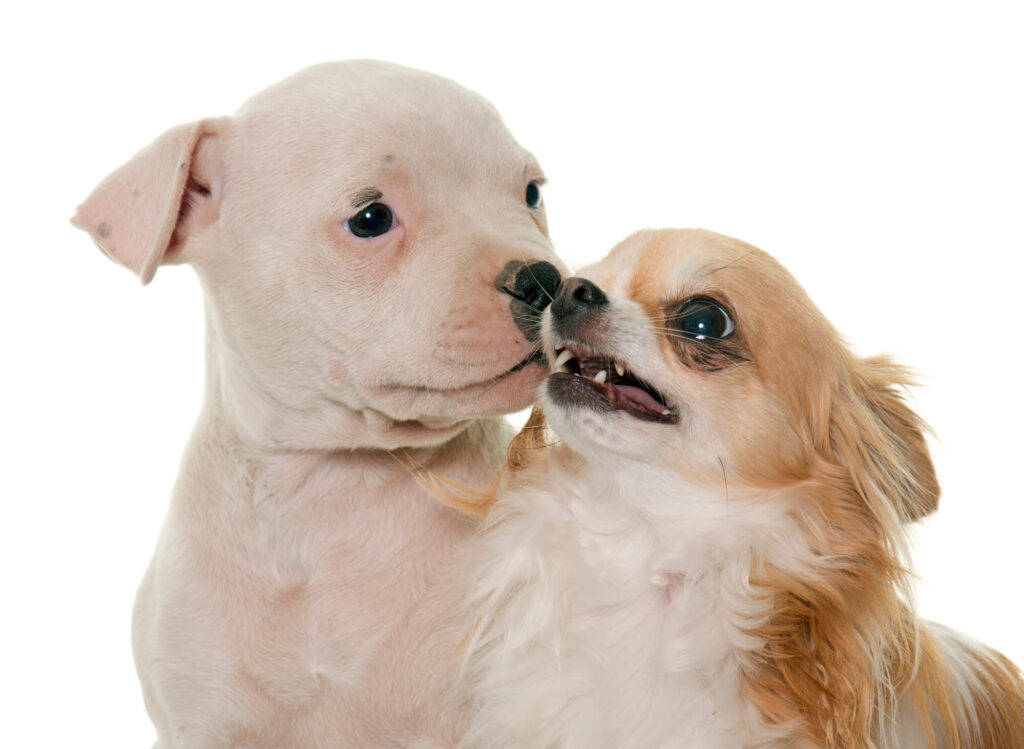
Signs of an Aggressive Chihuahua
Chihuahuas are bred to be companion dogs, and they typically form strong bonds with their owners. However, some Chihuahuas can become aggressive, and this behavior is often misunderstood or mishandled.
Some warning signs of an aggressive Chihuahua are:
- Barking excessively
- Growling
- Snapping
- Lunging
- Curled lip or bared teeth
- Stiff tail
- Rigid body
- Raised hair
If your Chihuahua is displaying any of these behaviors, they need space immediately and time to calm down. Avoid punishment, which will only make the aggression worse.
9 Tips to Reduce Chihuahua Aggression
If your Chihuahua is displaying aggression, there are several things you can do to help reduce their aggression, with the most important being hiring a professional trainer. Chihuahua aggression problems can be difficult to handle on your own.

1. Hire a Positive Reinforcement Trainer
Positive reinforcement training is a type of training that rewards your Chihuahua for desired behaviors, instead of punishing them for undesirable behaviors.
For example, if your Chihuahua sits calmly while a dog or person walks by, you would give them a treat.
This type of training is effective because it helps your Chihuahua associate good behaviors with positive outcomes. This is especially helpful for fearful or nervous dogs.
Reach out to a certified trainer or behaviorist in your area to get started. You can also find positive reinforcement trainers online that offer virtual training sessions.
To get you started with positive reinforcement training, you will need to select some treats as a reward. We have an entire post about the best dog treats specifically for Chihuahuas!
2. Avoid Punishment
Punishing your Chihuahua will only make the aggression worse. Instead, focus on positive reinforcement and rewards-based training.
If you punish your dog for growling, they may escalate to biting next time instead since they were punished for warning with a growl.
Punishment also decimates the trust between you and your dog, a trust that is essential for a strong owner-dog bond.
3. Socialization
One of the best ways to prevent aggression is to socialize your Chihuahua as a young puppy. This means exposing them to different people, animals, and environments in a positive way.
If your Chihuahua is a rescue, it’s still important to socialize them. However, it may take more time and patience since they may be fearful or mistrust new people and experiences.
Take things slowly and give your Chihuahua plenty of time to adjust. If they seem uncomfortable or stressed, then that is enough for them for that day.
Remember, socialization is a lifelong process, so continue to expose your Chihuahua to new people and experiences throughout their life.
4. Vet Checkup
If your Chihuahua’s aggression suddenly appears, it could be a sign of an underlying medical condition. Make sure to take them to the vet for a checkup to rule out any possible health issues.
5. Medication
If your Chihuahua’s aggression is severe, your veterinarian may prescribe medication to help them relax and manage their anxiety and fear. This should always be done under the guidance of a professional.
6. Avoid Triggers
You need to set boundaries and avoid your Chihuahua’s triggers. This will help prevent them from feeling the need to lash out or defend themselves.
For example, if your dog is reactive to other dogs on walks, then don’t let every dog you pass say hello. Just keep on walking or turn around and go a different way so they don’t get triggered.
You can get leash sleeves from Etsy that say things like “I need space” or “Do not approach” to help communicate this to other dog owners.
Another example is if your dog is aggressive toward kids then if you see kids on a walk, turn the other way. If you have children in the house, teach them about dog body language and the warning signs of aggression.
That way, the kids won’t invade your Chihuahua’s space or pick them up at the wrong moments.
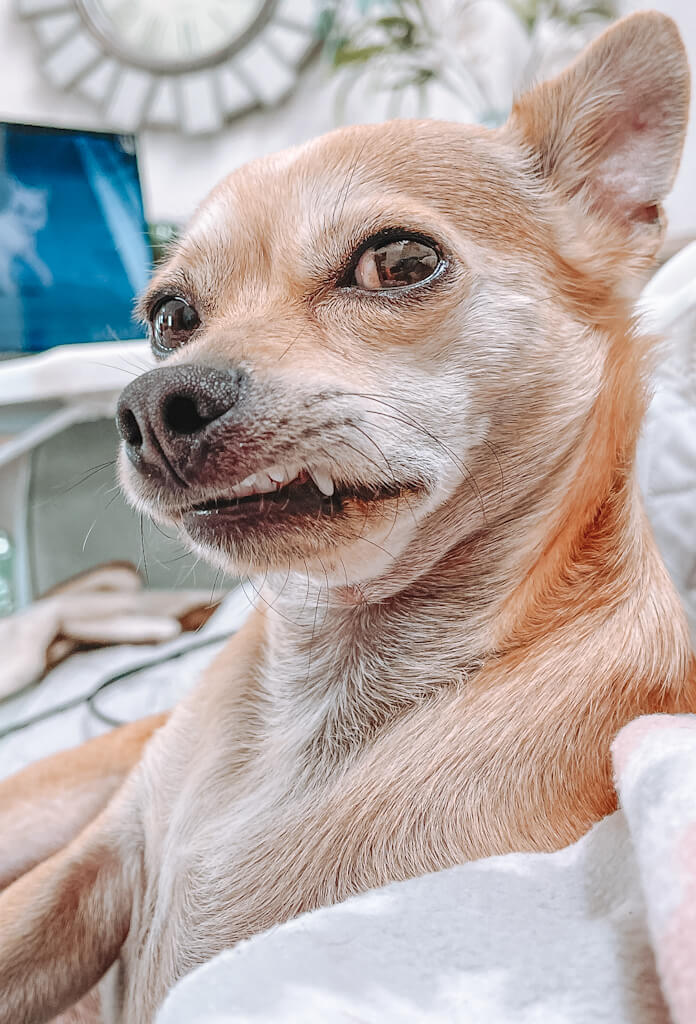
7. Spaying and Neutering
This can help to reduce aggression in some dogs, especially males.
While there’s no guarantee that spaying or neutering will stop your Chihuahua’s aggression, it’s often recommended.
8. Don’t Ignore Aggressive Behavior
Just because your Chihuahua is small doesn’t mean you should let them off the hook for aggressive behavior. Ignoring, laughing off, or making excuses for aggression will only make it worse.
Aggressive behavior in big dogs is often taken more seriously, but we should also treat it seriously in small dogs. After all, a bite is a bite, no matter the size of the dog.
9. Mental Stimulation and Exercise
Make sure your Chihuahua is getting enough mental stimulation and exercise every day.
This can help to tire them out both mentally and physically, which can help to reduce aggression.
Some good ways to provide mental stimulation are with food puzzles, healthy chews, interactive toys, and games.
Walking at times of the day when fewer people and dogs are around or exercising indoors will help to avoid triggers.
How to Treat Chis Better and Improve the Stigma
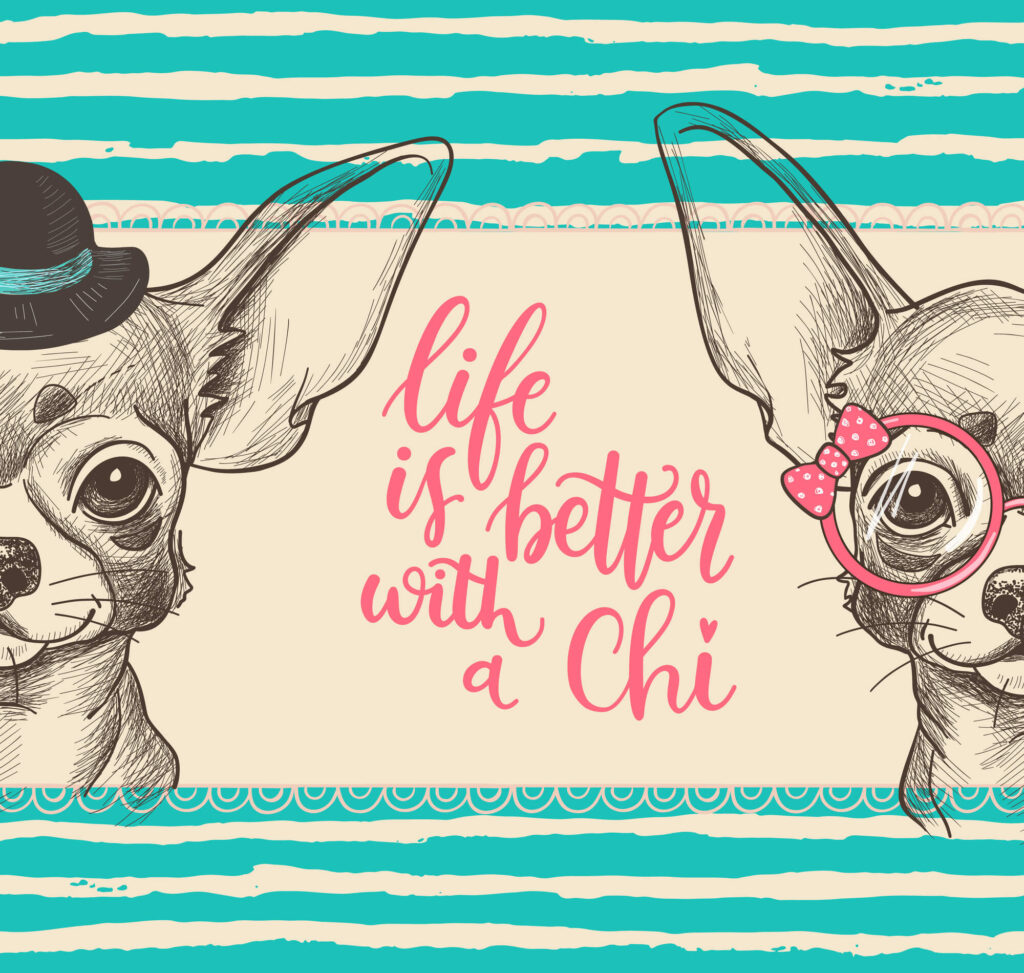
Chihuahuas have unfortunately gained a bit of a bad reputation in recent years. Too often, they are portrayed as yappy, neurotic dogs that are more trouble than they’re worth.
Due to this, you might be thinking, “are all Chihuahuas mean?”
However, the truth is that Chihuahuas can make wonderful pets. They are intelligent and affectionate, and they bond strongly with their owners. With proper training and socialization, you can teach your Chihuahua to be a well-mannered dog.
Unfortunately, the negative stereotypes surrounding chihuahuas often prevent them from getting the love and care they deserve. It’s important to change the way we think about these dogs in order to improve their lives.
By raising awareness, we can help to break down the barriers to prevent them from being stereotyped and portrayed in a negative light.
If you are a Chihuahua owner or you see Chihuahuas when you’re out and about, there are some suggestions:
- Be a responsible Chihuahua owner and properly train your dog! You will show people that Chis can be just as well-behaved as any other dog.
- Don’t carry your Chihuahua everywhere (unless they’re old or have a health condition, etc.). This can teach them to be more anxious and fearful of new environments. Instead, let them safely interact and socialize with other dogs and people.
- Don’t put your Chihuahua in negative or dangerous situations where they will feel the need to defend themselves, such as being around off-leash dogs or being in loud and crowded places. This can cause them to become stressed and aggressive.
- Don’t taunt Chihuahuas or rile them up. Making or watching videos of people doing this is not funny, it’s just mean.
- Avoid calling them names like demon dog, hellhound, demonic, or killer.
- Treat them like you would a big dog, so don’t invade their space.
- Don’t manhandle them just because they’re small and easy to pick up.
- Educate people about Chihuahuas and remember to stand up for your Chihuahua’s needs. Their space and comfort matter more than a stranger’s request to meet your dog.
- Learn dog body language so you can recognize the signs of aggression so you don’t approach a dog that doesn’t want to be bothered.
- If you are a stranger meeting a Chihuahua, don’t stare them in the eyes and don’t try to immediately pet them. Let them approach you first.
Summary
So there you have your answer to: why are Chihuahuas so mean and aggressive?
While some of these reasons why Chihuahuas are aggressive can be chalked up to their small size, that’s not always the case. Chihuahuas can be aggressive and mean due to a variety of reasons, including lack of socialization, fear, anxiety, and genetics.
With proper training and socialization, you can help your Chihuahua to become a well-mannered dog.
FAQ
Are Chihuahuas More Aggressive Than Pitbulls?
In reality, there is no definitive answer to this question.
While Pitbulls may have a reputation for being aggressive, factors such as individual temperament, early socialization, and training play a much larger role in determining a dog’s personality.
Pitbulls have a bad reputation for being aggressive, but this isn’t always the case. In fact, Pitbulls can be very sweet and loving dogs.
Similarly, Chihuahuas are often stereotyped as yappy and high-strung, but many are actually quite docile and loving.
Why Are Chihuahuas Called Ankle Biters?
Chihuahuas are known for their feisty personalities. Despite their small size, Chihuahuas are not afraid to stand up for themselves, and they have been known to bite people who they feel threatened by.
Chihuahuas are low to the ground, making it easy for them to nip at ankles. This behavior is often the result of fear or insecurity, and it can be corrected with proper training.
Why Do Chihuahuas Bite Their Owners?
Chihuahuas can bite their owners for many reasons. Anxiety, excitement, and mistrust can all lead to biting.
If your Chihuahua is feeling threatened or scared, they may bite in order to protect themselves. Teething puppies often bite out of curiosity or playfulness.
If your Chi resource guards, they may bite in order to protect their toys or food or if their space has been invaded, it may start with a warning growl and lead to a nip.
What Is the Most Aggressive Dog?
When it comes to aggressive dogs, there are a few breeds that stand out from the rest.
Pitbulls, Rottweilers, Doberman Pinschers, and German Shepherds are all known for their potential to be aggressive, and each has been involved in numerous attacks.
Unsurprisingly, Chihuahuas are also involved in a lot of dog bite incidents.
Why Are Chihuahuas So Angry?
Many Chihuahuas are angry because they feel threatened or frustrated. They might be anxious or fearful of their surroundings, and they may lash out in order to protect themselves.
Chihuahuas may also become angry if they are not properly socialized or if they have been abused.

